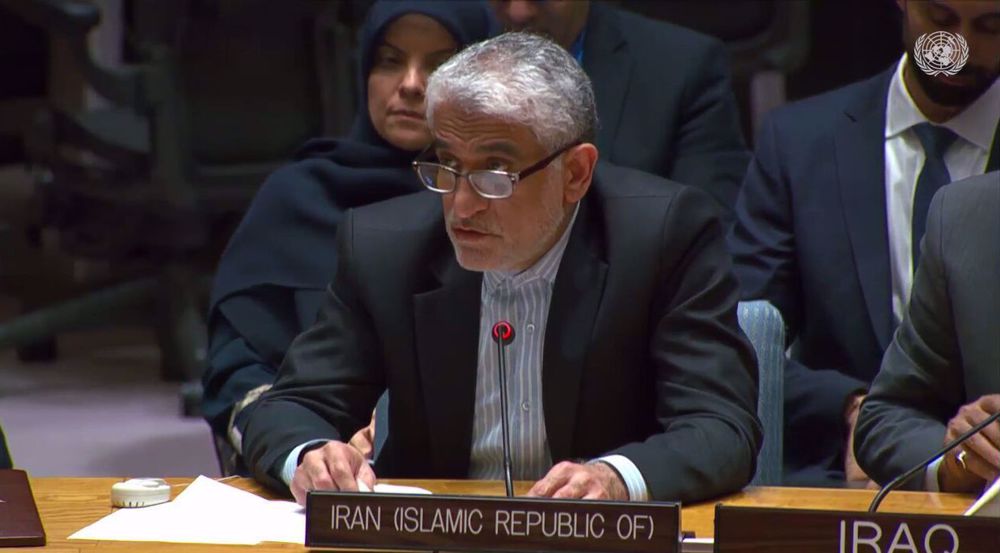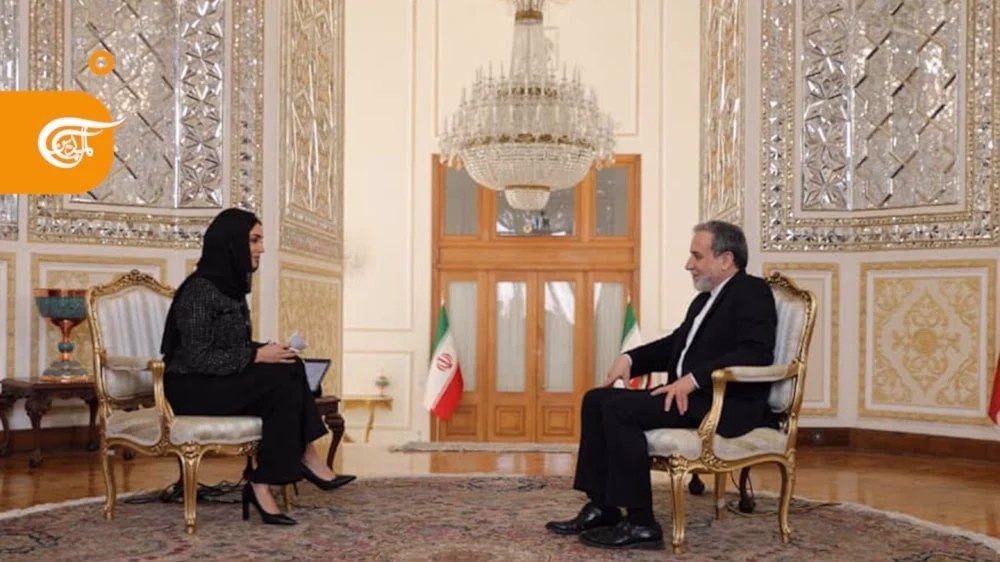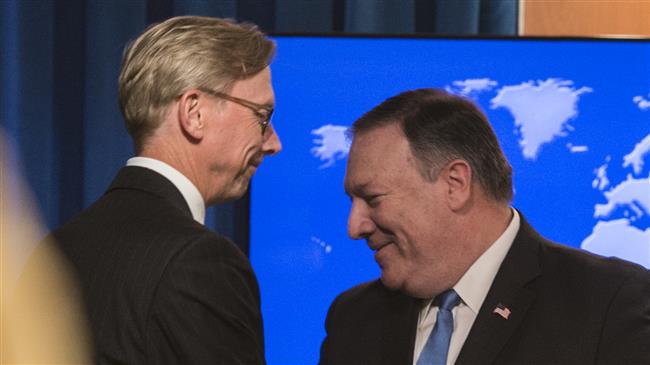Pompeo accuses Iran of 'violence' after Iran shoots down US spy drone
US Secretary of State Mike Pompeo has accused Iran of “violence and disinformation” after Iran shoots down an American state-of-the-art spy drone over its territorial waters, repeating claims without evidence that the aircraft was targeted over international waters.
In a statement released Saturday evening, Pompeo accused Iranian authorities of lying about Washington’s efforts to bring Tehran to the negotiating table using the government of Oman as an intermediary, claiming that the US would only engage with Iran “when the time is right.”
“President Trump did not pass a message through Oman calling for talks with Iran,” the top US diplomat claimed in the statement, adding: “We have made our position abundantly clear. We are willing to engage when the time is right."
Pompeo’s claim came just over a week after Japan’s Prime Minister Shinzo Abe met with Leader of the Islamic Revolution Ayatollah Seyyed Ali Khamenei in Iran, publicly revealing that he carried a message from US President Donald Trump for renewed talks between Washington and Tehran.
The Iranian Leader, however, snubbed the offer insisting that he considers Trump “unworthy of exchanging messages with,” and adding: “I do not have and will not have any response for him.”
The Leader further argued that Iran has “no trust” in the United States and will not at all “repeat the bitter experience” of negotiating with Washington after it breached the multilateral 2015 nuclear deal, pointing out that it was not the first time the US sought hostilities against the Islamic Republic.
Pompeo’s statement went on to mock what he claimed as a “hand-drawn” map produced by Iran to prove the American spy drone had crossed into Iranian territory, insisting that Washington had proved "beyond any doubt that Iran shot down a US unmanned aircraft in international airspace."
This is while all the wreckage of the spy drone has been recovered in Iran’s territorial waters and publicly displayed by an Iranian military commander.
Trump retracts comments on calling off Iran strike
Pompeo’s statement coincided with a Saturday evening tweet posted by Trump, in which he accused the media of distorting his statement about calling off an attack against Iran, and he appeared to suggest that a military strike was still pending.
"I never called the strike against Iran “BACK,” as people are incorrectly reporting, I just stopped it from going forward at this time!" he tweeted.
Pentagon launched anti-Iran cyber strikes: Reports
Meanwhile, US news outlets have cited unnamed sources to report that Trump has approved an offensive cyber strike that disabled Iranian computer systems used to control rocket and missile launches.
“The cyber strikes, launched on Thursday night by personnel with US Cyber Command, were in the works for weeks if not months,” the Washington Post reported Saturday citing “people familiar with the matter” who further noted that the Pentagon proposed launching them after attacks on two oil tankers in the Sea of Oman earlier this month, which the US has attributed to Iran with murky evidence discounted by other nations and disputed by crew members of the tankers involved.
According to the report, the strike against the Islamic Revolutionary Guard Corps (IRGC) was coordinated with US Central Command (CENTCOM), the military organization with purview of activity through the Middle East.
It emphasized that the sources spoke on condition of anonymity and the White House declined to comment, as did officials at US Cyber Command.
Moreover, Pentagon spokeswoman Elissa Smith said, "As a matter of policy and for operational security, we do not discuss cyberspace operations, intelligence or planning."
"This operation imposes costs on the growing Iranian cyber threat, but also serves to defend the United States Navy and shipping operations in the Strait of Hormuz," the daily quoted Thomas Bossert, a former senior White House cyber official in the Trump administration, as saying.
Thursday's strikes against the IRGC, the sources claimed, represented the first offensive show of force since Cyber Command was elevated to a full combatant command in May.
Cybercom launched an operation against Russia last autumn to deny Internet "trolls" affiliated with the Internet Research Agency the ability to carry out political influence operations on US social media platforms.
But the operation against Iran was more disabling, it further claimed, quoting one of the sources as saying: "This is not something they can put back together so easily."
Iranian cyber forces, the report added, have tried to hack US naval ships and navigation capabilities in the Persian Gulf region for the last few years.
On Saturday, the Department of Homeland Security issued a warning to US industry that Iran has stepped up its cyber targeting of critical industries - to include oil, gas and other energy sectors - and government agencies, and has the potential to disrupt or destroy systems.
"There's no question that there's been an increase in Iranian cyber activity," said Christopher Krebs, director of DHS' Cybersecurity and Infrastructure Security Agency.
Tehran has time and again asserted that it does not seek war with the US, yet stands ready to defend its interests in the region.
US vetoing of Gaza ceasefire resolution ‘disgraceful’: Iran’s UN envoy
VIDEO | IAEA adopts anti-Iran resolution tabled by E3
VIDEO | Iran's president urges Pope to help end Israel's onslaught in Gaza
Iran's senior legal official: ICC arrest warrant for Netanyahu ‘great victory'
Nov. 21: ‘Axis of Resistance’ operations against Israeli occupation
VIDEO | Israeli forces storm West Bank’s Jenin again, target civilians
Iran activates advanced centrifuges after IAEA's 'unjust' resolution
VIDEO | Press TV's news headlines













 This makes it easy to access the Press TV website
This makes it easy to access the Press TV website